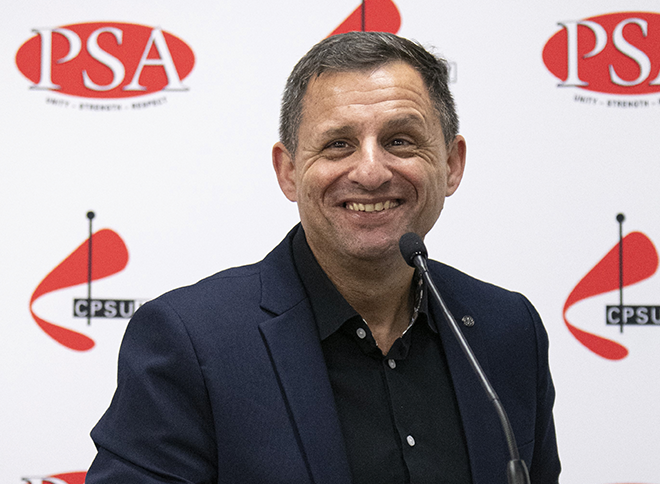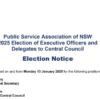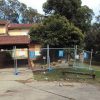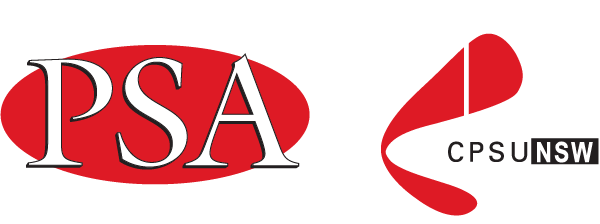The PSA CPSU NSW enters its 125th anniversary celebrations knowing it has the strength to determine power.
As his party faithful roared with approval, NSW Premier Elect Chris Minns announced one of his priorities: the end of the wages cap that had kept Public
Sector incomes down for a dozen years.
Mr Minns knew the wages cap was bad policy. He knew it suppressed economic growth, particularly in the regions. He knew it let down the essential workers who had guided NSW through the tumult of fire, flood and COVID-19.
He also knew that he had, fighting against his opponents during the election campaign, the state’s Public Sector unions, led by the PSA CPSU NSW.
“Leading up to the election, we asked all candidates and parties a series of questions about their policies on issues such as the wage cap, privatisation and an independent Industrial Relations Commission,” said PSA CPSU NSW General Secretary Stewart Little. “Responses from Labor, the Greens and many independent candidates supported our members. The Liberals and Nationals did not respond.
“From that, we knew that a fourth term of the Liberal National Coalition would have meant more of the same: a wage cap dragging our members’ real purchasing power down every year and government by a bunch of ideologues determined to sell as much of the state’s public assets as possible.
“It had to change.”
PSA CPSU NSW staff and members set their alarms and were up early, targeting commuters in train stations in marginal seats such as Penrith, which was held by then Deputy Premier Stuart Ayres.
The messaging on the wage cap was popular with members, but it was the PSA CPSU NSW’s anti-privatisation campaign that caught on with the wider public.
“People were sick of seeing their assets sold off to companies that were making billions from what were once things we all owned,” said Mr Little. “When footage emerged of two Liberal candidates saying they’d happily sell off our water supply to whoever was waving a cheque book, the people of NSW knew that the Coalition would never turn its back on privatisation.” The anti-privatisation message was a big part of the PSA CPSU NSW’s campaign in the final weeks before Election Day, with similar messages popping up on other organisations’ campaigns.

On election night, the new Premier beamed and thanked Public Sector unions for their work. The PSA CPSU NSW campaign had paid dividends in 2023, and demographic changes point to this remaining a successful political strategy Kosmos Samaras (pictured below right) is Director of political analysts Redbridge Group. He is also a former Victorian Labor Deputy Campaign Director. Mr Samaras, who spoke at the PSA CPSU NSW Annual Conference last year, said the union’s strategy ties in with the emergence of what he described to the ABC as Labor’s “new working class”, the people providing services to the people of NSW and Australia.
These are the people listening to the pitches from union leaders such as Mr Little before they head off to vote.
Mr Samaras said seats with high numbers of Public Sector workers are increasingly falling to Labor. These are often the seats on the outer suburbs that Liberal Party leaders such as Peter Dutton have lately focused their strategies around.
With a swing to Labor of 13 per cent, the once-safe Liberal seat of Camden now has a Labor MP, Sally Quinnell. On election night, a number of observers expressed surprise at the fact the seat went to the red column of Mr Minns. However, Mr Samaras points out 13 per cent of the employed people in the seat are Public Sector workers.
He said at last year’s PSA CPSU NSW annual conference the election campaign had a direct bearing on the result there.
“Camden, Parramatta are stand outs,” he said. “But even in East Hills, the numbers of Public Sector workers were enough to have an impact.”
All three seats went to Labor in 2023. Mr Samaras said the Opposition needs to change its Public Sector policies or be
swamped by demographic change.
“Our economy has transformed over the past 30 years, from manufacturing to service and knowledge, which predominantly employs Public Sector workers,” he said. “This type of workforce will only increase in size and no political party can form government without their support.”
He said he believes there are no seats in the state where a party can benefit from demonising Public Sector workers, who “enjoy high levels of respect and support across the community”.
Mr Little said the PSA CPSU NSW is aware his members will be increasingly courted by political parties.
“We will approach every election knowing we are a major player and get what is best for our members,” he said.

















Leave a Comment
Your email address will not be published. Required fields are marked with *